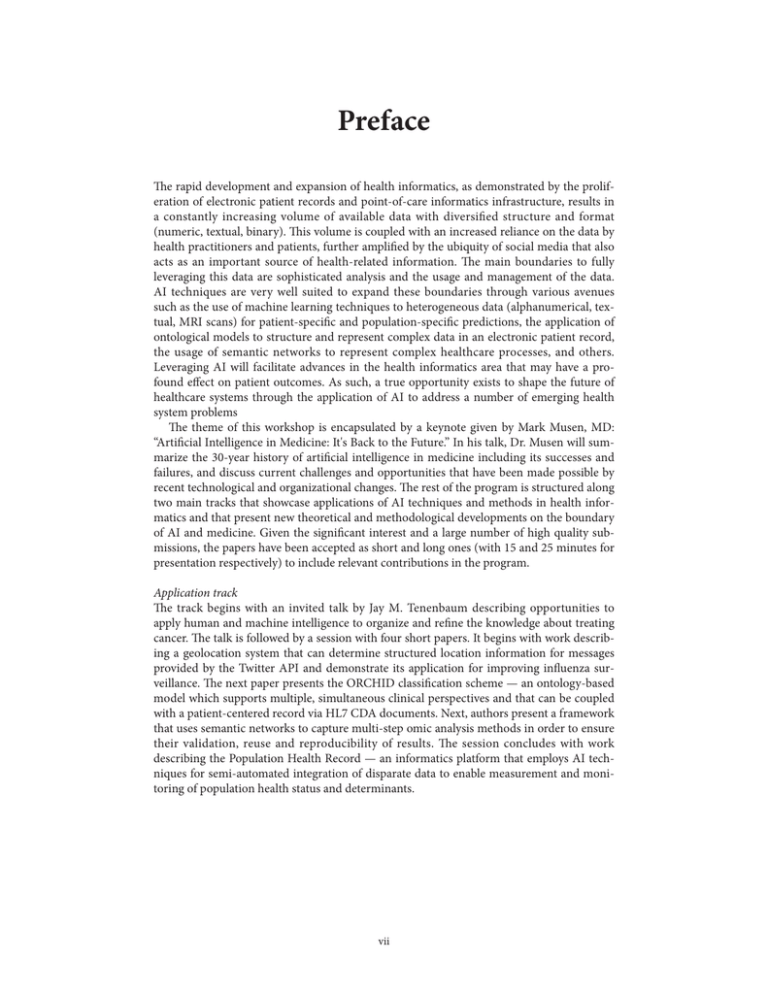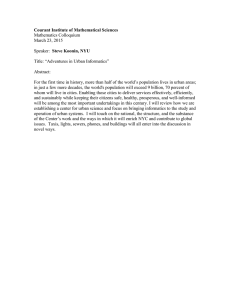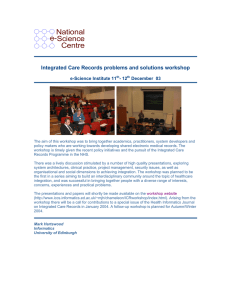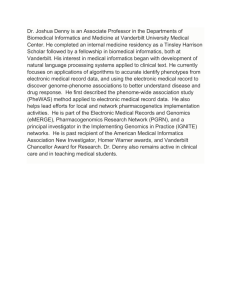Preface
advertisement

Preface e rapid development and expansion of health informatics, as demonstrated by the proliferation of electronic patient records and point-of-care informatics infrastructure, results in a constantly increasing volume of available data with diversified structure and format (numeric, textual, binary). is volume is coupled with an increased reliance on the data by health practitioners and patients, further amplified by the ubiquity of social media that also acts as an important source of health-related information. e main boundaries to fully leveraging this data are sophisticated analysis and the usage and management of the data. AI techniques are very well suited to expand these boundaries through various avenues such as the use of machine learning techniques to heterogeneous data (alphanumerical, textual, MRI scans) for patient-specific and population-specific predictions, the application of ontological models to structure and represent complex data in an electronic patient record, the usage of semantic networks to represent complex healthcare processes, and others. Leveraging AI will facilitate advances in the health informatics area that may have a profound effect on patient outcomes. As such, a true opportunity exists to shape the future of healthcare systems through the application of AI to address a number of emerging health system problems e theme of this workshop is encapsulated by a keynote given by Mark Musen, MD: “Artificial Intelligence in Medicine: It's Back to the Future.” In his talk, Dr. Musen will summarize the 30-year history of artificial intelligence in medicine including its successes and failures, and discuss current challenges and opportunities that have been made possible by recent technological and organizational changes. e rest of the program is structured along two main tracks that showcase applications of AI techniques and methods in health informatics and that present new theoretical and methodological developments on the boundary of AI and medicine. Given the significant interest and a large number of high quality submissions, the papers have been accepted as short and long ones (with 15 and 25 minutes for presentation respectively) to include relevant contributions in the program. Application track e track begins with an invited talk by Jay M. Tenenbaum describing opportunities to apply human and machine intelligence to organize and refine the knowledge about treating cancer. e talk is followed by a session with four short papers. It begins with work describing a geolocation system that can determine structured location information for messages provided by the Twitter API and demonstrate its application for improving influenza surveillance. e next paper presents the ORCHID classification scheme — an ontology-based model which supports multiple, simultaneous clinical perspectives and that can be coupled with a patient-centered record via HL7 CDA documents. Next, authors present a framework that uses semantic networks to capture multi-step omic analysis methods in order to ensure their validation, reuse and reproducibility of results. e session concludes with work describing the Population Health Record — an informatics platform that employs AI techniques for semi-automated integration of disparate data to enable measurement and monitoring of population health status and determinants. vii eory track e theory track starts with an invited talk by Barry O'Sullivan on the challenges and opportunities for applying constraint programming to gaining health knowledge. e track covers nine papers that are organized into two sessions. e first session devoted to broadly understood classification problems covers five papers — two short and three long ones. e first short paper describes the Graph Neural Analyzer system that employs machine learning (ML) to MRI scans in order to discover structural correlations with a variety of potential classifications including Alzheimer's disease. In the first long presentation the authors describe the use of ML to predict the risk of serious adverse reactions (such as a heart attack) in patients who are treated with certain drugs. e next set of authors present a technique to leverage rationale annotations from narrative chest X-ray reports in order to improve prediction of ventilator assisted pneumonia. e last long presentation in the first session explores the use of four ML models (naïve Bayes, decision trees, neural networks, support vector machines) constructed from neuropsychological and demographic data to predict clinical dementia rating and diagnosis. Finally, the session concludes with a short presentation examining the diffusion of information related to vaccine safety in social media and defines major dissemination mechanisms (genuine interest, noncorrelated views and antivaccine propaganda). e second session goes beyond classification and prediction and includes four long papers that focus on the analysis of other types of decision problems. e first paper describes the use of a Markov network learning method to learn interactions between musculoskeletal disorders and cardiovascular. Next authors describe an automatic algorithm that uses constraint logic programming for mitigating interactions between pairs of clinical practice guidelines and present its extension to handle two important constructs frequently occurring in guidelines — iterative actions forming a cycle and numerical measurements. e next work presents an approach to reasoning about resource allocation and scheduling in multiagent systems that takes into consideration the costs of preempting an agent from its current task, and demonstrates application of the proposed methodology to allocating doctors to patients during mass casualty incidents. Finally, authors describe the analysis of patient reviews of doctors using a novel probabilistic joint model of aspect and sentiment based on Factorial LDA and report the most representative words with respect to positive and negative sentiment. Our goal for the workshop is to bring together health informatics researchers working on AI research and AI researchers working on methodological research applied to health informatics, and have them to share results of their work. Martin Michalowski Workshop Chair viii




